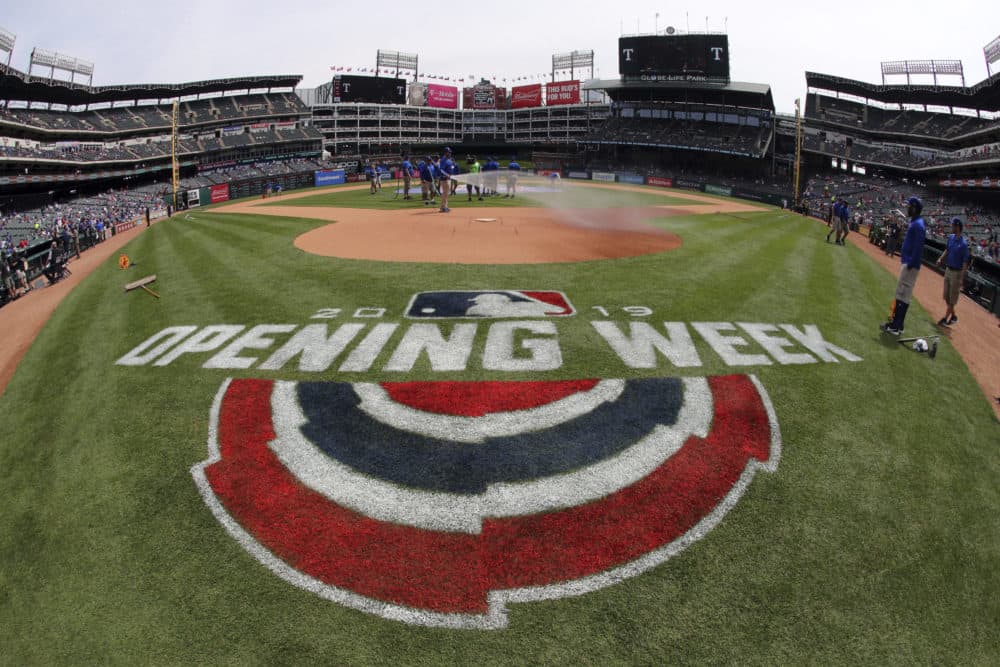Advertisement
Commentary
How To Fix Baseball

As Major League Baseball begins another slog, er, season, we are reminded/bombarded from every angle with every trope about the erstwhile national pastime to the point of nausea.
“Nothing rouses the national spirit with more native purity than the start of baseball,’’ writes Adam Chandler in The Washington Post. Or this headline atop Dan Shaughnessy's piece in the Boston Globe: “The Red Sox are back, and, for many of us, that means life is better.” Spoiler alert: The person who owns the Red Sox also owns the Globe. So, for him, life is better.
I like baseball as much as the next guy. But the baseball I like — and I suspect I’m not alone here — has not been around for 50 years. The sport that once deserved to be called the national pastime has been hijacked by marketers (“Sweet Caroline”), the analytics crowd (WAR! What is it good for? Absolutely nothing!) and, most important of all, by the Luddites who oversee Major League Baseball.
Some of the obvious wrongs and shortcomings in MLB are so easily fixed. Where to start?
I like baseball as much as the next guy. But the baseball I like ... has not been around for 50 years
How about the most obvious inanity of all: The two leagues play by different rules. How can a major league sport be taken seriously when half of its teams play by one set of rules and the other half plays by another? It makes no sense! Yet this has been going on since 1973. And MLB is fine with that? It makes for ridiculous situations in inter-league games where pitchers who haven’t had an at-bat all season have to bat. It’s beyond stupid.
One game, one set of rules. Either get rid of the DH or make it universal.
Then there’s the economics. Of the four major professional sports, only one doesn’t have a salary cap. You want to fight income inequality? Tackle MLB. According to Spotrac, the Red Sox have the highest payroll in MLB at around $225 million. The Tampa Bay Rays have the lowest at $65 million. The three top pitchers on the Red Sox — Chris Sale, David Price and Rick Porcello — earn more than the entire Rays team.
The average team salary, according to ESPN, is around $133 million. But aside from a luxury tax, which the rich teams can afford, there is no mechanism to even the economic playing field. So it allows the Red Sox to drop $217 million on David Price, or more than a $100 million on J.D. Martinez, because, well, they can.
Advertisement

A salary cap along the lines of the one in the NBA would force teams like the Rays to spend more and force teams like the Red Sox to spend less. It would allow small-market teams a better chance to keep their best players. And it might even lead to greater parity.
I know — baseball hasn’t had a repeat champion since the Yankees in 2002. But since then, the wealthiest teams (Red Sox, Giants, Cardinals, Cubs and Yankees) have accounted for 11 World Series titles. The big-spending Dodgers have been in the last two World Series.
Then there’s the unbalanced schedule. The Red Sox this season will play one-third of their games against either Toronto, Baltimore or Tampa Bay. Teams you might like to see, like the Astros, Indians or Angels, make one appearance at Fenway Park. The Red Sox will be done with the Astros by the end of May and will have finished with Seattle and Oakland by mid-May. But by all means, bring on the Rays, Jays and O’s for more, more, more.
Then there’s the elephant-in-the-room bugaboo: time of game. How much longer can baseball keep acknowledging it has a time problem and pretty much do nothing about it? MLB did agree to shorten the breaks between innings — by five whole seconds! The Post’s Neil Greenberg, in a recent piece headlined, "Prepare For Baseball’s Most Boring Year Yet," writes, “baseball, as we once knew it, is dead.” He adds that attendance last year was the lowest in the last 15 years.
How much longer can baseball keep acknowledging it has a time problem and pretty much do nothing about it?
You want shorter games? Make the batter stay in the batter’s box. If he steps out, add a strike to the count. And as much as some baseball fans rhapsodize about 15-pitch at-bats, how about a limit, as there is for bunts? Why is a bunt different from a swing?
I could go on. About the encroaching analytics (Tony LaRussa started it with all his pitching micro-managing). And the silliness of the one-game playoff series, which resulted a few years back, when the Pittsburgh Pirates posted the second-best record in the regular season and then were eliminated in the one-game playoff.
We once could look forward to baseball arriving when spring did. No longer. We once could expect a season to wrap up before Halloween. No longer.
In 1981, after the hostages were released from Iran after 444 days in captivity, they were welcomed back to the United States. Commissioner Bowie Kuhn thought it would be a great idea to give each of them lifetime passes to MLB games. That prompted the following from Beano Cook, a sports commentator and historian.
“Lifetime passes for major league baseball games? Haven’t they suffered enough?"
